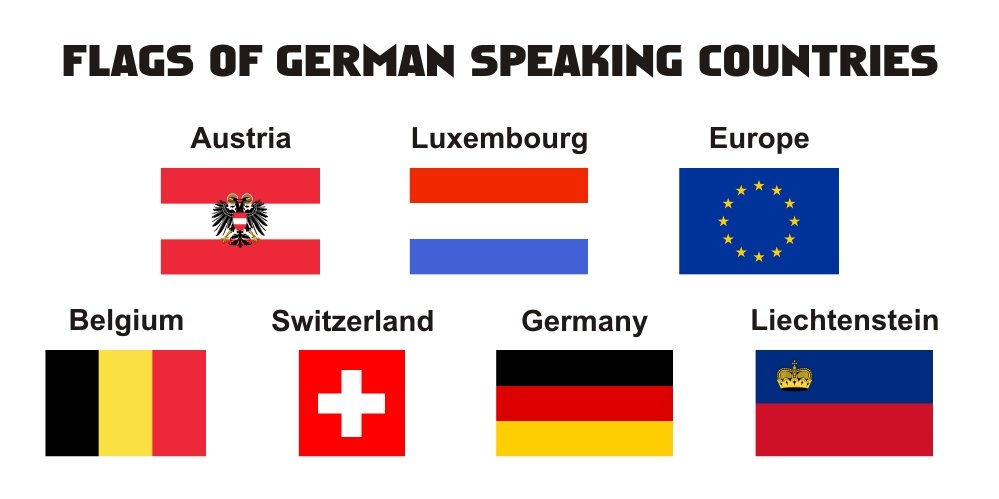Learn German Online
And at our Centers in Mulund and Airoli
German is the official language of Germany, Austria, and Liechtenstein.
In addition, it is one of four official languages in Switzerland, and one of three commonly used in Luxembourg.
There are over 120 million native speakers of German, primarily in Europe, though it is spoken regionally by native speaker minorities in 40 countries.
As an international language of business, scientific research, publishing and tourism, it’s estimated that German is spoken as a foreign language by an additional 80 million people worldwide.


WHY LEARN GERMAN?
German is Most Widely Spoken Language in Europe
1. German is easy to acquire
Let’s start off by debunking the myth that German is especially hard. Despite all the jokes that are being made about it being an impossible language, if you are an English speaker, you are actually already quite advantaged.
2. German is the language of inventors and innovators
It is said that Germany is the country of poets and thinkers – Das Land der Dichter und Denker. There is definitely no denying the second part. A large percentage of the world’s most impressive achievements were first conceived of in German.
3. German is an important language in academia
With that big a number of award-winning scientists from its home country, it might not come as a surprise that German is very important in the academic community. In fact, it ranks second as the most commonly used scientific language.
4. German is the gateway to a world-class higher education
One of the reasons why German has such a high standing in the science community is the fact that Germany’s universities have an excellent international reputation. In the year 2011 ,the country was the fourth most popular destination for students from abroad with more than a quarter million foreigners being enrolled in German schools.
6. German companies are global market leaders
Speaking of German companies: want to work for a business which is an international market leader in its field? Having German skills on your resume might be able to help you get in the door.
Germany is home to a large number of economic global players. Siemens, Volkswagen, Adidas and Lufthansa are globally recognized brands and corporations. The country also hosts some of the biggest international trade fairs including CeBIT, the world’s largest exhibition for information technology, as well as the IFA trade fair for consumer electronics.
GERMAN COURSE DETAILS
Everything You Need To Know About Before Starting
A1:
Can understand and use familiar, everyday expressions and very simple sentences, which relate to the satisfying of concrete needs. Can introduce him/herself and others as well as ask others about themselves – e.g. where they live, who they know and what they own – and can respond to questions of this nature. Can communicate in a simple manner if the person they are speaking to speaks slowly and clearly and is willing to help.
A2:
Can understand sentences and commonly used expressions associated with topics directly related to his/her direct circumstances (e.g. personal information or information about his/her family, shopping, work, immediate surroundings). Can make him/herself understood in simple, routine situations dealing with a simple and direct exchange of information on familiar and common topics. Can describe his/her background and education, immediate surroundings and other things associated with immediate needs in a simple way.
B1:
Can understand the main points when clear, standard language is used and the focus is on familiar topics associated with work, school, leisure time, etc. Can deal with most situations typically encountered when travelling in the language region. Can express him/herself simply and coherently regarding familiar topics and areas of personal interest. Can report on experiences and events, describe dreams, hopes and goals as well as make short statements to justify or explain his/her own views and plans.
B2:
Can understand sentences and commonly used expressions associated with topics directly related to his/her direct circumstances (e.g. personal information or information about his/her family, shopping, work, immediate surroundings). Can make him/herself understood in simple, routine situations dealing with a simple and direct exchange of information on familiar and common topics. Can describe his/her background and education, immediate surroundings and other things associated with immediate needs in a simple way.
C1:
Can understand a wide range of challenging, longer texts and also grasp implicit meanings. Can express him/herself spontaneously and fluently without having to search for words frequently and noticeably. Can use the language effectively and flexibly in his/her social and professional life or in training and studies. Can make clear, structured and detailed statements on complex topics and apply various means of text association appropriately in the process.
C2:
Can effortlessly understand practically everything which he/she reads or hears. Can summarize information from various written and spoken sources, logically recounting the reasons and explanations. Can express him/herself spontaneously with high fluency and precision and also make finer nuances of meaning clear in more complex topics.

